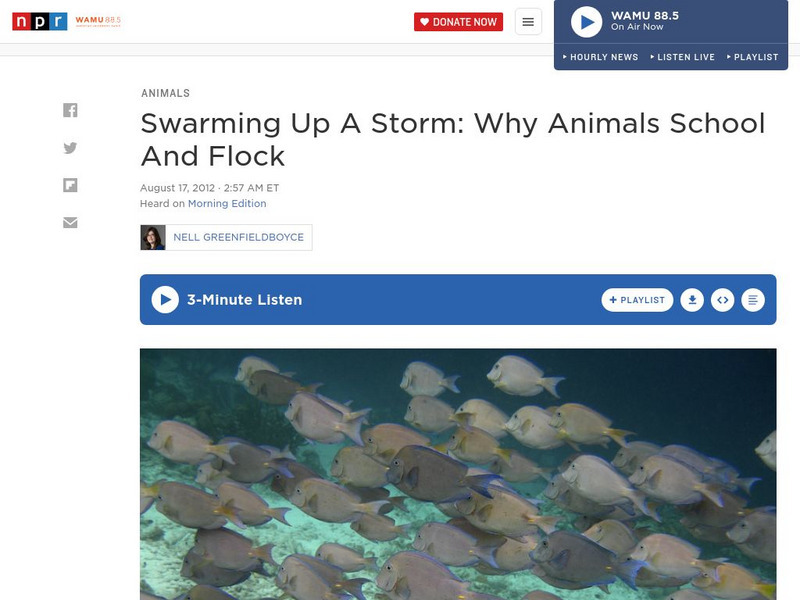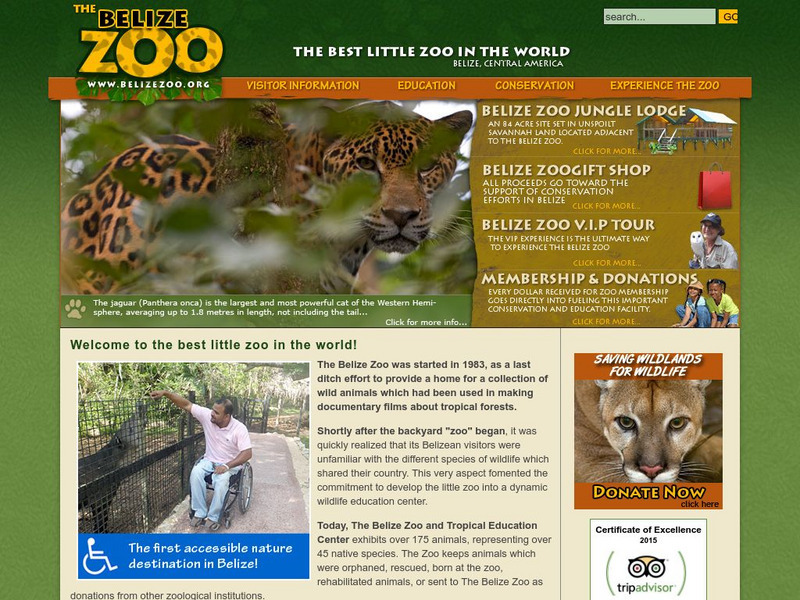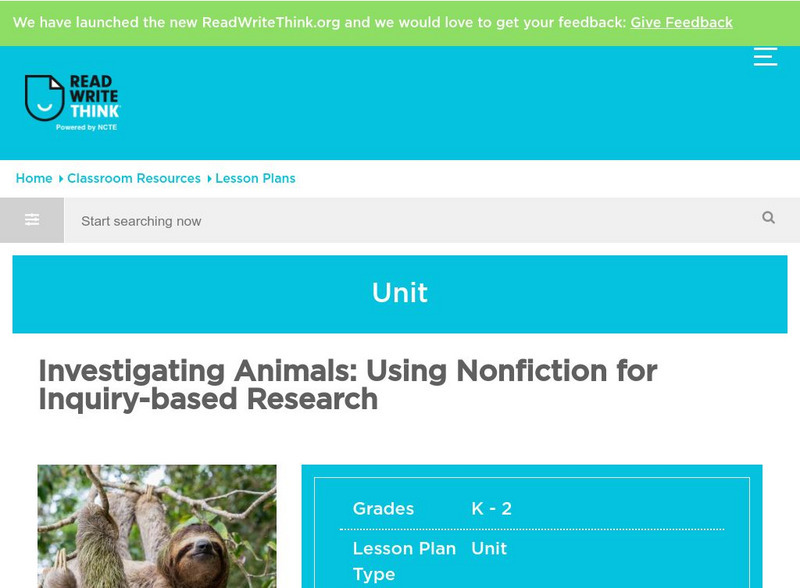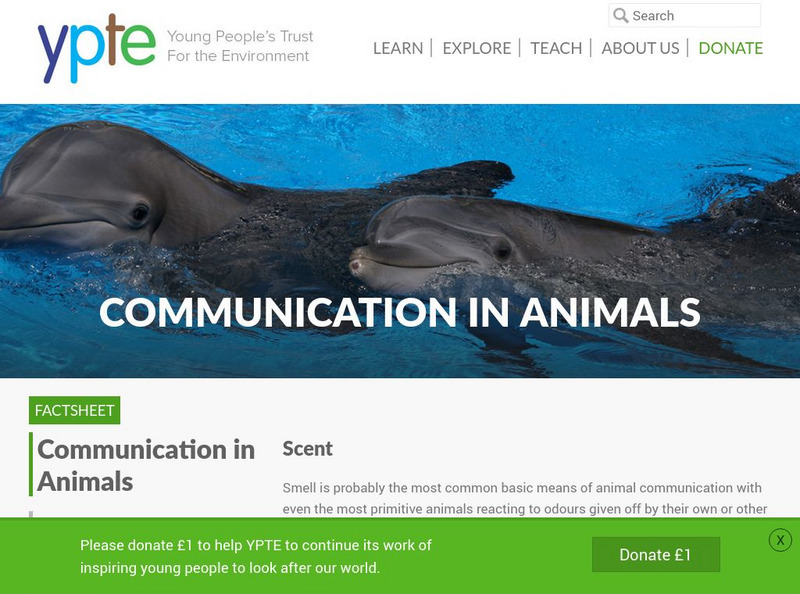University of Florida
Florida Museum of Natural History: Animals 1: Fur, Fins, Feathers, and More
This teacher's guide focuses on familiar animals such as mammals, birds, reptiles, amphibians, and fish.
Vocabulary University
My vocabulary.com: Animals in Their Habitats
A variety of vocabulary puzzles and activities are provided on the theme of animals in their habitats.
Flow of History
Flow of History: The Domestication of Animals and Its Effects
A synopsis on the domestication of animals traces the beginnings as well as the effects on prehistoric man. A flow chart to see how this development fits into history is provided.
Other
Simple Science: Animals in Motion
The innovative resource explores the biomechanics of bipeds and quadrupeds. Learners study how animals and humans move by starting, slowing, and stopping animations. The activity has an interactive online version and a printable data sheet.
Science Struck
Science Struck: Grassland Biome: Animals and Plants
Describes the characteristics, biodiversity, and the adaptations of the plants and animals of temperate and tropical grasslands.
TED Talks
Ted: Ted Ed: Do Animals Have Language?
All animals communicate. But do they have language? Michele Bishop details the four specific qualities we associate with language and investigates whether or not certain animals utilize some or all of those qualities to communicate. [4:55]
TED Talks
Ted: Ted Ed: How Do Animals Experience Pain?
How do the animals all around us experience pain? Robyn J. Crook examines pain in both vertebrate and invertebrate animals. [5:06]
A-Z Animals
A Z Animals: Animal Facts: Pike (Esox)
Provides photographs and a fact card about the pika, a freshwater fish. Discusses the five species, where they are found, physical characteristics, diet, animals they prey upon, features of the female pike, reproduction, and population...
Time
Time: 50 Circus Animals Need New Homes When Ringling Bros. Shuts Down
With shrinking numbers in attendance, the Ringling Brothers Circus will be ending its long run in May 2017. The end of the circus means many animals will need to find new homes.
A-Z Animals
A Z Animals: Reference: Diet
This entry identifies the defining characteristics of the various diets of animals, including those that are herbivores, carnivores and omnivores.
A-Z Animals
A Z Animals: Reference: Habitats: Mountains
Find out about the plant and animal life in different types of mountain habitats.
A-Z Animals
A Z Animals: Reference: Habitats: Swamps and Wetlands
Learn about the plants, animals, and other characteristics of some wetland ecosystems.
TED Talks
Ted: Ted Ed: How Do Animals See in the Dark?
To human eyes, the world at night is a formless canvas of grey. Many nocturnal animals, on the other hand, experience a rich and varied world, bursting with details, shapes, and colors.Anna Stockl uncovers the science behind night...
NPR: National Public Radio
Npr: Swarming Up a Storm: Why Animals School and Flock
Insight into why groups of animals swarm, flock, an school together.
Science Struck
Science Struck: Desert Biome: A Guide to Its Animals and Plants
Describes many of the plants and animals that live in deserts and their special adaptations that have enabled them to survive there. Also describes four types of deserts.
Science Struck
Science Struck: Taiga Biome: Taiga Animals and Plants
Describes the characteristics of the taiga biome and the plants and animals that live there.
Other
Buzzle.com: Animal Sake: Triassic Period Animals
Brief descriptions of the climate of the Triassic Period and of the plants and animals. Includes a lengthy list of the animals that lived during that time.
Other
The Belize Zoo Animals of the Tropical Forest
This zoo is primarily a collection of wild animals indigenous to the tropical forests of Belize. At the bottom of the page, the animals are organized into 3 categories: mammals, birds, and reptiles.
University of Florida
Baldwin Library: Friendship of Animals
A scanned copy of the 1896 publication of Friendship of Animals by Edith Carrington, a book of poems and stories for children.
University of Florida
Baldwin Library: The Book of Animals
A scanned copy of the 1850 publication of The Book of Animals by T. Bilby, a nonfiction book for children.
Howard Hughes Medical Institute
Hhmi: Bio Interactive: Explore Your Inner Animals
Did you know parts of our body was inherited from distant animal ancestors? In this interactive students will investigate different anatomical features of the human body to reveal our evolutionary history. Learn how humans share...
ReadWriteThink
Read Write Think: Using Nonfiction for Inquiry Based Research
Contains plans for lessons that help students explore the nonfiction genre by doing inquiry-based research on animals. In addition to objectives and standards, this instructional plan contains links to sites used in the lessons as well...
Other
Young People's Trust for the Environment: Communication in Animals
Facts about the many ways animals communicate. Included is information about scent, sound, sight, and touch.
National Endowment for the Humanities
Neh: Edsit Ement: Folktales and Ecology: Animals & Humans in Cooperation,conflict
For this lesson plan, learners will consider Folktales and Ecology: Animals and Humans in Cooperation and Conflict. Worksheets and other supporting materials can be found under the Resources tab.
Other popular searches
- Farm Animals
- Zoo Animals
- Nocturnal Animals
- Prehistoric Animals
- Arctic Animals
- Jungle Animals
- Plants and Animals
- Desert Animals
- Animals and Their Habitats
- Oviparous Animals
- Classification of Animals
- Winter Animals



















